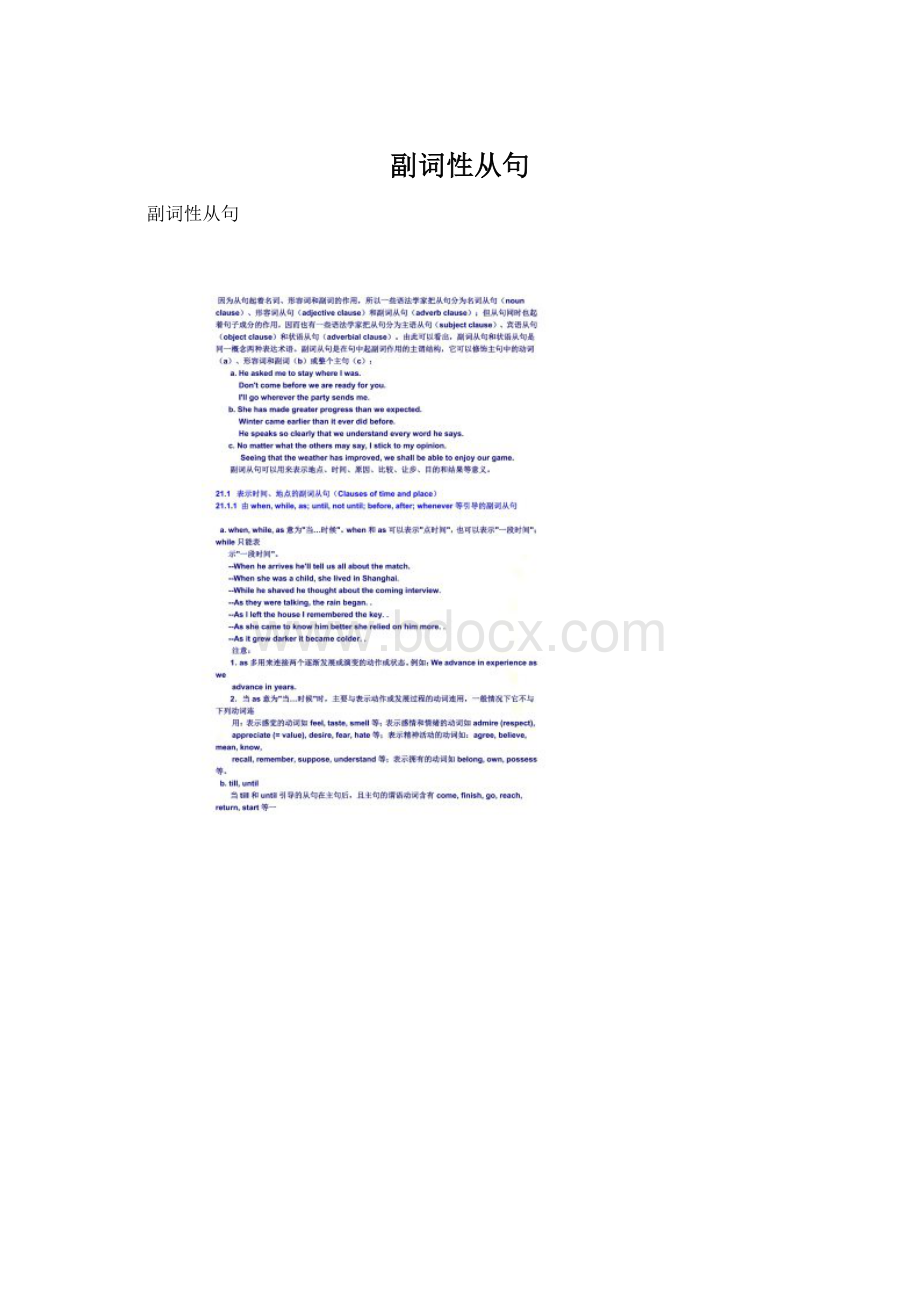副词性从句.docx
《副词性从句.docx》由会员分享,可在线阅读,更多相关《副词性从句.docx(9页珍藏版)》请在冰豆网上搜索。

副词性从句
副词性从句
--YougetyoungereverytimeIseeyou.
--EverytimeIcatchacold,Ihavepaininmyback.
21.1.2由aslongas,everytime,eachtime,nexttime,lasttime等引导的时间副词从句
aslongas意为"在…的时候";everytime意为"每次";eachtime意为"每逢…的时候";nexttime意
为"下次";lasttime意为"上次";bythetime意为"在…时候以前"。
--YoucanneverenterthishouseaslongasIliveinit.
(我住在这里的时候,你永远不许进入这个房子。
)
--Aslongas(=while)Ilive,youwillnotwantforanything.
(只要我活在世上,你就不会缺乏任何东西。
)
aslongas引导的从句有很强的条件含义:
--I'mhappyaslongasmychildrenare.
--He'llcontinueworkingsolongashehasthestrength.
--Shesmileseverytimesheseesme.
--Eachtimeshegotintotrouble,shewouldaskmeforhelp.
--I'mgoingtoseehimnexttimehecomestoShanghai.
--HehadimpressedmethewaythefirsttimeImethim.
(我第一次碰到他时他就给我这个印象。
)
--Bythetimethealarmwentoff,Iwasawake.
--LasttimeIsawMary,shesaidhewasgoingtoFrance.
21.1.3由once,assoonas,themoment(that),theinstant(that),theminute(that),directly,
immediately,instantly引导的副词从句
该词组引导的副词从句表示主句的动作在从句的动作一瞬间之后。
这组连接词的含义为"一…
就…"。
--Onceyouseeher,youwillfindwhatIsayistrue.
--Onceyouobjecttoaman,everythinghedoesiswrong.
once引导的副词从句同时含有时间和条件意味:
--Onceyouunderstandthisrule,youwillhavenofurtherdifficulty.
=Assoonasyouunderstandthisrule,youwillhavenofurtherdifficulty.
=Ifyouunderstandthisrule,youwillhavenofurtherdifficulty.
--Sheweptaloudassoonassheheardthenews.
--Themomentshesawmeherfacelightedupwithasmile.
--Theinstantheopenedthedoor,adogranin.
--Theminute(that)hesawme,hebegantocry.
--I'llgiveyouananswerimmediatelyI'vefinishedreadingyourfile.
--Instantlythebuttonispressed,themineexplodes.
--Everyonewillseethemisprintdirectlytheypickthebookup.
注意:
themoment,theinstant,theminute是名词当连词用,后面可接that,但通常省略;directly,
immediately, instantly是副词当连词用。
21.1.4由since,eversince引导的副词从句
该组副词从句表示主句动作的开始时间,从句中谓语动词通常用一般过去时态,而主句中谓语
动词通常用现在完成时态。
--Ihaven'tseenJohnsincehereturnedfromParis.
--IthasbeenrainingeversinceIcamehome.
--Ithasbeentenyearssincemyfatherlefthome.
--SinceIstartedswimming,Ihavelostfivepounds.
Itis…和Ithasbeen…可以通用。
例如:
--Itisfiveyearssincehejoinedthearmy.
--Ithasbeenfiveyearssincehejoinedthearmy.
21.1.5由nosooner…than,barely/hardly/scarcely…when引导的副词从句
该组副词从句表示主句的动作发生在从句的动作一瞬间之前。
这组连接词的含义为"一…就…"。
如果把no sooner,barely,hardly,scarcely置于句首就须用倒装结构。
--Shehadnosoonerheardthenewsthanshefainted.
--Nosoonerhadsheheardthenewsthanshefainted.
--Hehadbarelyarrivedatthestationwhenthetrainbegantoleave.
--Barelyhadhearrivedatthestationwhenthetrainbegantoleave.
--Ihadscarcelycomeinwhenthephonerang.
--ScarcelyhadIcomeinwhenthephonerang.
--Wehadhardlygotintothecountrywhenitbegantorain.
--Hardlyhadwegotintothecountrywhenitbegantorain.
注意:
在这组句型中,主句的谓语动词通常用过去完成式,而副词从句的动词通常用过去式。
21.1.6由where,wherever引导的表示地点的副词从句
--Wherethereisnorain,farmingisdifficultorpossible.
--Wewillmeetwhereverthecommitteedecides.
--Shefollowshimwhereverhegoes.
wherever引导的从句有时具有很强的让步含义,特别是当wherever引导的从句放在主句前,而且谓
语动词有may或might等情态动词时。
--Whereveryoumaygo,hewillnotforgetyou.
everywhere(that)和anywhere(that)也可以引导表示地点的副词从句,其功能和意义和wherever相
近。
--Everywheretheyappearedtherewereovations.
(无论走到哪里,他们都受到热烈欢迎。
)
--EverywhereIgo,Ifindthesamething.
--Youmaygoanywhereyoulike.
注意:
地点副词从句可以放在主句的前面或后面。
放在主句前面时,常用逗号把它同主句隔开;如放在
主句后,就不用逗号隔开。
21.2 表示原因、目的和结果的副词从句(Clausesofcause,purposeandresult) |21.1|21.3|top|
21.2.1because,since,as
because,since,as是引导表示原因的副词从句最常用的三个词,其中because语气最强,since次
之,as语气最弱。
a.because从句通常置于主句之后,强调直接原因;有时也可置于主句之前。
--Hewasangrybecausewewerelate..
--Thefuseblewbecausewehaveoverloadedthecircuit.
--Becauseitwastoodarktogoon,wecampedthere.
--Becausehewantsustomakerapidprogress,theteacherisstrictwithus.
b.可以用否定词not和并列连词but形成并列because从句:
--I'mgoingonatriptomorrow,becauseIhaveto,notbecauseIwantto.
--Hestole,notbecausehewantedthemoneybutbecauseheliked.
(他偷东西,并不是因为他想要钱,而是他有这种毛病。
)
c.在强调原因分句时,只能用because从句,而不能用since从句或as从句:
--Itwasbecausehewasillthathedidn'tgowithus.
--Itisbecausehehasbehavedsobadlythathemustbepunished.
注意:
1.在回答以疑问词why开头的问句时,只能用because而不能用since或as。
2.并列连词for从句表示因果关系时,可以和because交替使用。
--couldnothaveseenme,for/becauseIwasnotthere.
所不同的只是because从句的位置可前可后,而for从句只能后置。
当for从句不表示因果关系,而只是对前面主句的内容加以解释或推断时,这时,because不能代替
for。
--Itrainedlastnight,forthegroundiswetthismorning.
d.由as或since引导的原因副词从句,只是附带说明主句的内容,它通常位于主句之前,但有时也可
置于主句之后。
--Ashewassuchafool,Irefusedtolistentohim.
--Asthesoupwasverysalty,wewerethirstyafterwards
(因为这汤很咸,后来我们渴得厉害。
)
--Astherewasverylittlesupport,thestrikewasnotsuccessful.
--Ileftthepartyat10p.m.asIhadtogetupearlythenextday.
由于since表示的原因,指的是讲话者和听话者已知的事实,since除有"因为"意义外,还含有"既然"
之意。
--Sincehecan'tanswerthequestion,you'dbetterasksomeoneelse.
--Sincenooneisagainstit,wewilladopttheproposal..
--Sinceyoucan'ttypetheletteryourself,you'llhavetoaskSusantodoitforyou..
--Hecan'tbeverytired,sincehehaswalkedonlyhalfamile.
21.2.2由now(that)(因为,既然),seeingthat(因为,鉴于),consideringthat(鉴于,考虑
到),in that(因为)引导的表原因的副词从句
--Now(that)youareabigboy,youmustbehavebetter.
(既然你是个大孩子了,你的行为必须检点些。
)
--Now(that)youhavefinishedthework,youarefreetodowhatyoulike.
--Seeingthatitisraininghardtonight,wewillhavetostayhereforthenight.
--Seeingthatitseemsasifitwillrainsoon,wehadbetterleavenow.
--Consideringthatheisaboy,Iforgivehisbadmanners.
--Hedidpoorlyinhisexaminations,consideringthathehadstudiedhardforthem.
--Mendifferfrombrutesinthattheycanthinkandspeak.
(人与兽类的区别在于人能思维和讲话。
)
--Thespeechisallthemoreimportantinthatitwasmadebyamanofauthority.
注意:
1.在口语里常把nowthat中的that省去,这时now与表示原因的as和since有相同意义。
2.now(that)引导的副词从句,时间意义很强时,被看作时间副词从句。
--NowthatIcometothinkofit,Iseeyouareright.
3.inthat的含义为"inthefactthat(因为…的事实)",相当于because。
21.2.3由that,sothat,inorderthat,forfearthat引导的表示目的副词从句
a.当主句的动词为现在时、现在完成时或将来时时,that,sothat和inorderthat后从句的谓语多用
may/ can/will+动词原形。
--BringitnearerthatImayseeitbetter.
--Shipscarrylifeboatssothatthecrewcanescapeiftheshipsinks.
--Thesemenrisktheirlivesinorderthatwemaylivemoresafely.
--Ihavelitthefiresothatthehousewillbewarmwhentheyreturn.
b.当主句的动词为一般过去时、过去进行时或过去完成时时,that,sothat和inorderthat后从句的谓
语多用should,could,might或would+动词原形。
--Theydiedthatwemightlive.(他们是为了我们的生存而死的。
)
--Wearrivedearlysothatwecouldgetgoodseats.
--Hewrotehisdiaryincodesothathiswifewouldn'tbeabletoreadit.
(为了不让妻子看懂,他用密码写日记。
)
--Wehiditcarefullysothatnooneshouldseeit.
--Wesenttheletterbyairmailinorderthatitmightreachthemingoodtime.
--Inorderthatnoonemightenter,theservantlockedthedoor.
c.lest,forfear和incase引导的表目的的副词从句,含义为"以免;唯恐;以防备;为了不"。
--Iputawaymypistollestheshouldtouchit.
--Steelandironproductsareoftencoatedlesttheyshouldrust.
(钢铁制品常常涂以保护层,以免生锈。
)
--I'llbekindtoherlestshedecidetoleaveme.
--Hehasbeenworkinghardforfearthatheshouldfailinthefinalexams.
--Iboughtthecaratonceforfear(that)hemightchangehismind.
--Shutthewindowforfear(that)itmayrain.
--Youmustbequietincasethefisharefrightened.
--Bettertakemoreclothesincasetheweatheriscold.
--You'dbettergethisroomreadyincaseheshouldcomehometoday.
注意:
1.lest后从句的谓语多由should+动词原形,有时只用动词原形。
2.forfear(that)后从句的谓语可以用should/might或would+动词原形,或may/shall/will+动
词原形。
3.incase后从句的谓语形式可根据主句谓语形式相应变化;在对从句谈到的事没有足够把握时,
可以用should+动词原形。
21.2.4由so…that,such…that等表结果的副词从句引导的副词从句
在so…that和such…that中,so是副词,其后可以接动词、形容词、副词;而such为形容词,其
后只可接名词。
--Sheissohonestagirlthatallherteacherslikeher.
--Thesnowfellsofastthatourfootstepsweresooncovered.
--ThebuswassofullthatIcouldhardlyturnaround.
--Weleftinsuchahurrythatweforgottolockthedoor.
--Theyhadsuchafiercedogthatnoonedaredtogoneartheirhouse.
--HespokeinsuchlowvoicethatIcouldnothearhim.
--Therewassomuchdustthatwecouldn'tseewhatwashappening.
--Somanystudentscomplainedthattheteachercancelledthepretest.
so放在句首,句子要用倒装语序
--SoabsorbedwashethatNathaliehadn'tdaredtomakeasound.
--Soterriblewasthestormthat